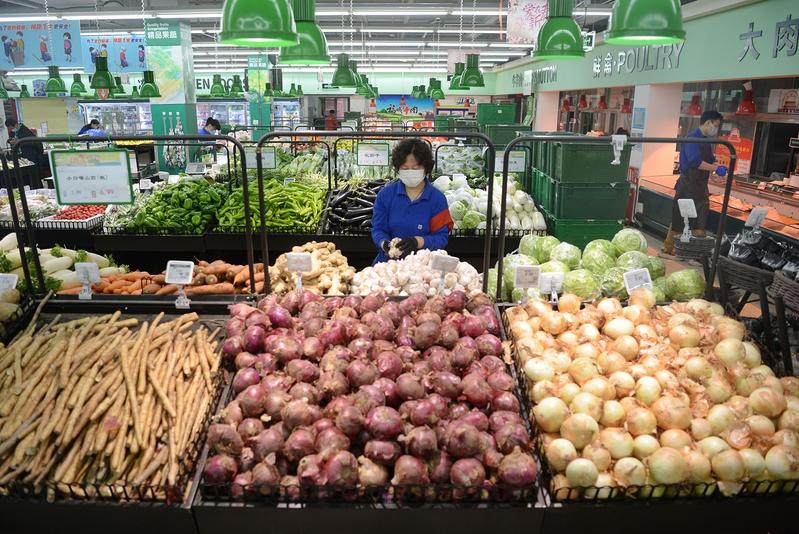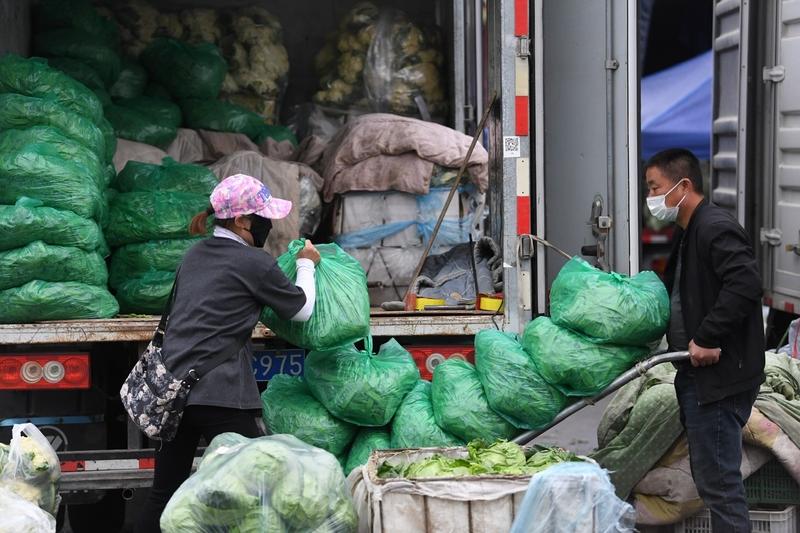Measures guarantee residents access to food, medication
 Markets in Chaoyang district have received sufficient supplies of daily necessities since the resurgence of COVID-19 cases in Beijing last month. (WEI TONG / FOR CHINA DAILY)
Markets in Chaoyang district have received sufficient supplies of daily necessities since the resurgence of COVID-19 cases in Beijing last month. (WEI TONG / FOR CHINA DAILY)
Li Jin, who lives in Beijing's Chaoyang district, resorted to panic buying on the night of April 24, when the municipal government announced that it had designated several residential communities as controlled zones due to a sudden outbreak of COVID-19.
"I live on the East Third Ring Road near some zones, and feared that my apartment building might soon be included in them. I rushed to a supermarket and bought three times as much food as I normally purchase," Li said.
"I even wanted to buy a large freezer, but I abandoned this idea because there was no room for it at home."
However, Li quickly discovered that she needn't have bought so much food, as takeout orders and fresh vegetables could be delivered to her home as usual-they just took a little bit longer to arrive.
"I panic-bought because everyone was preparing for the worst scenario, where logistics services might be affected and there would not be enough food for sale or deliveries," she said.
"But I needn't have worried, because the city is still functioning well and the prices of daily produce such as vegetables, fruit, eggs and flour have not been raised."
On the evening of April 24, many supermarkets stayed open longer to ensure that customers could buy everything they needed. Most outlets were crowded as people purchased daily necessities, with long lines forming outside.
Before and after the panic buying, the municipal government went to great lengths with wholesale markets and logistics companies to ensure supplies got through and that prices remained stable.
Faced with such a situation, it is not easy to keep a huge city with a population of more than 20 million functioning normally.
Local authorities, residential communities, e-commerce operators, delivery workers and supermarkets have all taken their responsibilities seriously and cooperated well to ensure the smooth operation of such a huge supply system.
 Residents in Beijing's Jinsong sub-district, which has been designated a controlled zone due to a sudden outbreak of COVID-19, buy vegetables in the neighborhood. (FU DING / FOR CHINA DAILY)
Residents in Beijing's Jinsong sub-district, which has been designated a controlled zone due to a sudden outbreak of COVID-19, buy vegetables in the neighborhood. (FU DING / FOR CHINA DAILY)
Swift action
Even though residents initially rushed to supermarkets to buy food, resulting in some empty shelves on April 24, the municipal government was quick to announce a series of measures to ensure supplies reached customers.
Next morning, residents found supermarket shelves full of food.
Zhao Weidong, deputy head of the city's commerce bureau, said at a news conference on April 25 that supermarkets had stocked up with double or triple the usual amount of daily goods-especially vegetables, eggs, fruit and meat-to cope with rapidly soaring demand.
"The city's supplies of daily goods are sufficient and prices are stable," Zhao said in a statement.
The commerce bureau said early last month that Beijing had enough reserves of daily necessities for the public, adding that supervision had been strengthened to ensure the prompt delivery of supplies to stores.
In addition to the lead taken by the authorities, State-owned and private enterprises are playing active roles in ensuring that supplies get through.
Xinfadi wholesale market in the city's Fengtai district, which supplies about 80 percent of Beijing's agricultural produce, swiftly stepped up supplies of vegetables from neighboring provinces.
Tong Wei, secretary to the market's president, said Xinfadi has sufficient stocks and a mature supply chain to ensure adequate supplies of agricultural produce for the city. The market is supplying more than 20,000 metric tons of vegetables daily to meet growing demand, Tong added.
Chaoyang, the district most affected by the latest COVID-19 outbreak, had registered more than 300 confirmed cases by Wednesday. Since April 25, the district has implemented a 24-hour stocking system, and its scores of supermarkets and food stores are replenishing stocks three to five times more than usual.
Since April 24, Wumart, a supermarket chain with many outlets in the Chinese capital, has extended its opening hours until the last customer leaves, while Carrefour has tripled its stocks.
Shi Tingfeng, an assistant manager at Carrefour's Shuangjing store in Chaoyang, said he finishes work at 2 am after restocking the shelves with colleagues, according to Beijing Business Today.
Food purchasing platforms, including Hema Xiansheng and Meituan, have extended their delivery hours to 24 hours a day in Beijing to ensure customers receive orders quickly.
In response to the soaring number of orders, Meituan strengthened its Beijing warehouse's distribution capacity, increasing stocks three to five times more than the usual level.
Liu Muhua, a manager at Meituan's Panjiayuan store in Chaoyang, said, "We have received more than 500 orders an hour in a morning recently, which seldom happened before.
"I replenish our stocks three times a day and I am going to work two hours earlier than usual."
As many residential communities in the city have been designated lockdown and controlled zones, where residents cannot leave unless it is absolutely necessary, numerous people are cooking at home.
In addition to the municipal government requiring restaurants in Chaoyang and other areas at risk to suspend dine-in services to avoid infection risks, many outlets have adopted takeout services for customers.
Xiabuxiabu Restaurant Management Co, which operates about 300 hot pot outlets in Beijing, said it has increased its takeout delivery service to meet demand.
The company said it had experienced a steady rise in the number of takeout orders since late last month. It has also increased stocks and prepared for a full resumption of work and production after the outbreak is contained.
Meanwhile, the apartment block in which Li Yuanlong, 32, lives in Tongzhou district was placed under controlled management for a week at the start of this month after a close COVID-19 contact was traced to the building.
Li, who seldom cooks, said he ordered takeout food for a week and it was always delivered promptly.
"I never expected to eat takeout hot pot alone at home, and I also ordered a cup of milk tea to cheer myself up during this special period," he said.
"I have never resorted to panic buying, as I believe Beijing is well equipped to cope with this situation."
Li and other residents are now allowed to leave their community, but he cannot go to his workplace, as it is located in Chaoyang, where the government has asked people to work from home.
He uses online apps to order food each day, and said he has experienced no problems, as numerous choices are available.
 Xinfadi wholesale market in Fengtai district has stepped up supplies of vegetables from neighboring provinces. (YANG YI / FOR CHINA DAILY)
Xinfadi wholesale market in Fengtai district has stepped up supplies of vegetables from neighboring provinces. (YANG YI / FOR CHINA DAILY)
Safety assured
Beijing residents are coping well in the current situation with the help of delivery services. Logistics companies and local authorities have made great efforts to ensure convenience and safety during the outbreak.
To reduce the risk of infection, the Beijing Municipal Bureau of Commerce recently issued a document outlining epidemic prevention and control guidelines for delivery workers during the outbreak.
Enterprises are required to prepare sufficient disinfection and protection materials, perform centralized management, and monitor the health of delivery workers.
Delivery staff members should have completed COVID-19 vaccination, wear N95 or KN95 face masks and disposable gloves, and there should be no physical contact during deliveries.
The guideline states that delivery services should first meet the demands of special groups in controlled zones, such as seniors and people with disabilities.
The authorities are also encouraging people to buy offline when possible to spare delivery resources for those most in need.
To ensure deliveries of takeout orders to residential communities in Chaoyang that are designated lockdown and controlled zones, the district government has drawn up a list of delivery personnel allowed to enter these communities, as long as they meet requirements such as providing negative nucleic acid test results.
Special cares
Patients who need medication and infants who require milk powder are among those with special needs in lockdown and controlled zones.
During the outbreak, governments at all levels and delivery companies have combined to meet special demands, such as supplying milk powder or a vehicle for a trip to hospital.
Meituan is working with more than 2,000 local chain drugstores to ensure sufficient medication is delivered to people in need. Some of its stores are stocking twice the amount of commonly used medicines than usual, while supplies of medication for children and drugs to treat chronic diseases have tripled.
Meituan allows customers to place orders anytime during the day and cooperates with drugstores to offer a 24-hour delivery service. To date, it has cooperated with 400 such stores to provide online purchasing services, covering 16 districts in Beijing.
Local authorities and medical institutions have also started to operate 24-hour online platforms, on which physicians and pharmacists answer health inquiries.
On May 5, Chaoyang put 200 car-hailing vehicles into service to meet emergency demand in controlled zones.
Yang Beibei, the district's deputy head, said at a news conference that more than 5,500 visits to hospitals were made by patients seeking medical services from April 22, when the outbreak started, to May 4. During the same period, over 14,000 inquiries about healthcare and medicines were answered.
"The control and prevention measures are aimed at curbing the spread of the virus. They should not prevent people receiving care," she said.
"We have detailed measures to ensure that people in lockdown, controlled and precautionary zones live normal lives, and we are deeply grateful for our citizens' support and cooperation during the epidemic."
Yao Yuxin contributed to this story.


